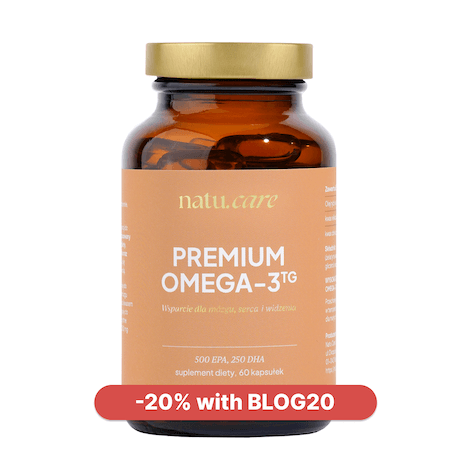How to moisturise hair to combat dryness and boost health
See how to effectively moisturise dry hair.


Learn more about our editorial process
.

Learn more about our editorial process
.

Learn more about our editorial process
.
Why you can trust us
Articles on Natu.Care are written based on scientific research, data from government websites and other reliable sources. The texts are written in cooperation with doctors, nutritionists and other health and beauty experts. Articles are reviewed before publication and during significant updates.
.Learn more about our editorial process
.Information about advertisements
Content on Natu.Care may contain links to products from the sale of which we may receive a commission. When creating content, we adhere to high editorial standards and take care to be objective about the products discussed. The presence of affiliate links is not dictated by our partners, and we select the products we review ourselves completely independently.
.Learn more about our terms and Conditions
.Dry hair can ruin your morning. Not only is it unmanageable, it can also become frizzy and hay-like in appearance...
Dry hair on your head can be dealt with, however. Below you will read about the best ways to moisturise your hair and make it shiny and silky again. It is well worth the effort, as hydrated, supple hair is also less susceptible to damage.
From this article you will learn:
- How to recognise dry hair.
- How to recognise dry hair.
- What dries out your strands.
- What to look for.
- What cosmetics to use to moisturise your hair.
- What to use to moisturise your hair.
- Whether a hairdresser can help you moisturise your hair. .
- What dietary supplements can improve the hydration of your strands. .
- Whether you can moisturise your hair with home remedies. .
- How you can take care of moisturizing your scalp. .
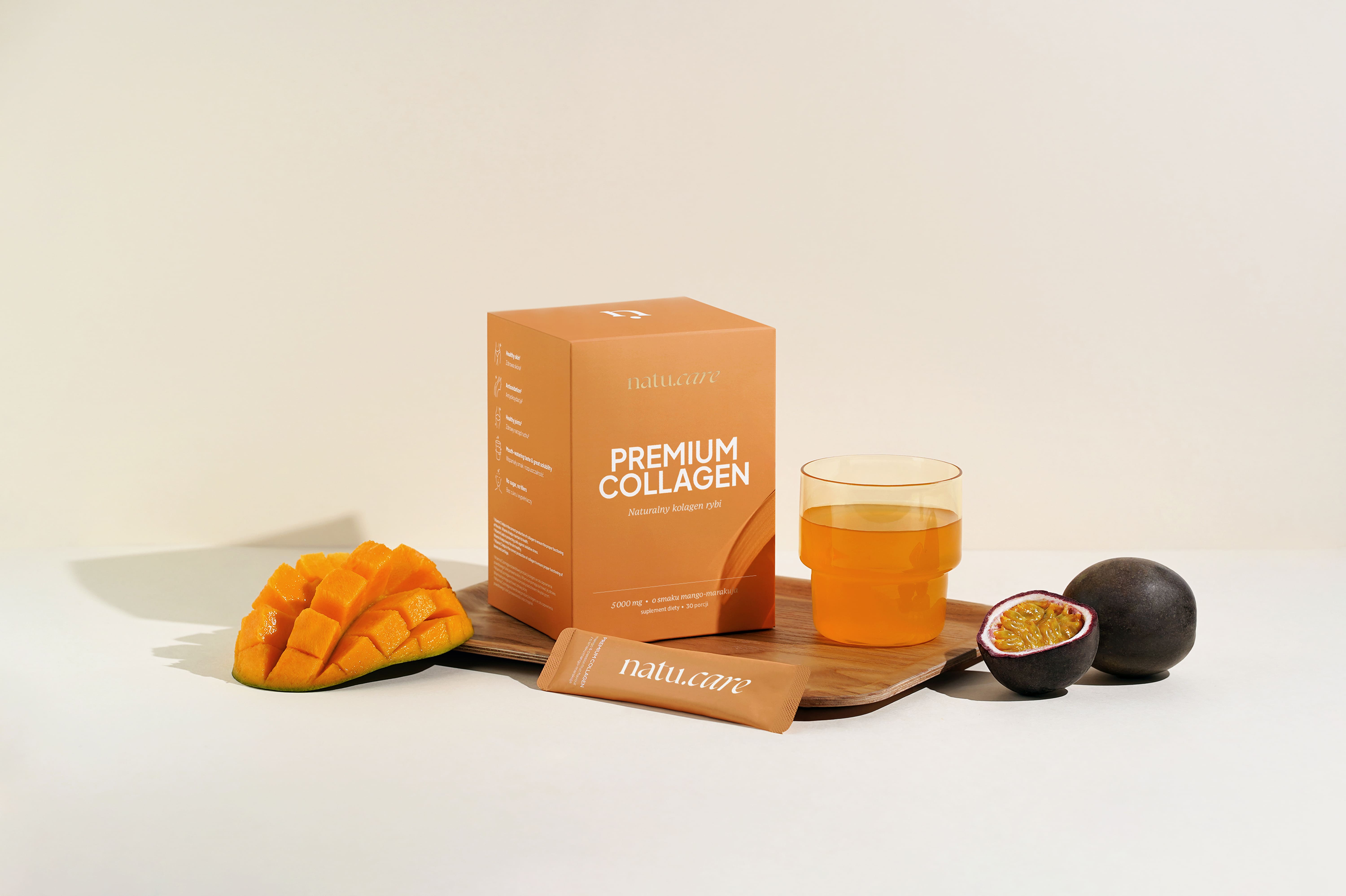
Sprawdź, za co pokochały go tysiące klientek Kolagen Premium 5000 mg, mango-marakuja
Natu.Care Kolagen Premium 5000 mg, mango-marakuja
Natu.Care Kolagen Premium dla zdrowia stawów, skóry, paznokci i włosów. Najlepsza przyswajalność. Optymalna dawka 5 000 lub 10 000 mg. Przebadany przez niezależne laboratorium.
Zobacz więcej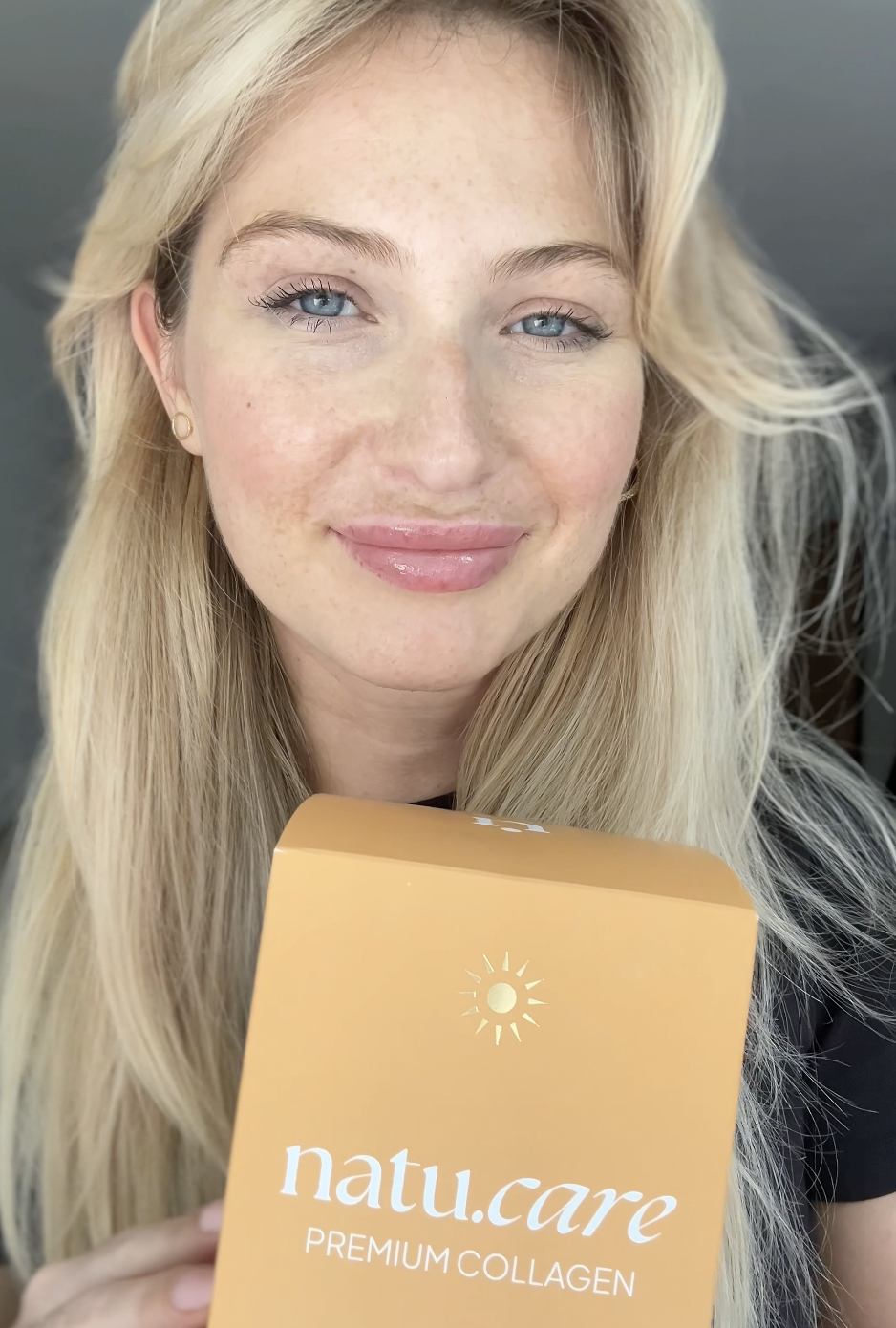
Wybrałam kolagen Natu.Care, ponieważ miał super opinie – a to było dla mnie bardzo ważne! Odkąd go stosuję, moja skóra znacznie się poprawiła i jest nawilżona, a na głowie pojawiły się nowe "baby hair".@Kasia S.
See also:
.
How does dry hair look like?
Dry hair you will recognise it primarily by the fact that it will be dull. They may also be a little coarse and have a tendency to frizz. We often say of hair that lacks moisture (and perhaps emollients) that it resembles hay.
Similarly, hair that is overproteinised, that is, hair that has taken in too many proteins during care, may look similar. It will then be characteristic that, in addition to the symptoms mentioned above, the locks will be stiff and may be less manageable.
Dry hair is also often damaged - prone to breakage and split ends. This can make it look thinning after a whileand.
Why hair can look thinner.
Why does hair dry out?
.
Hair dryness can occur due to a number of different factors:
.
- Styling treatments - daily exposure to flat irons, curling irons, but also backcombing, can damage the hair structure and lead to water loss. Styling sins are one of the most common reasons for dry hair.
- The following are some of the most common causes of dry hair.
- Lightening or perming - are carried out using preparations that are quite invasive to the hair. If the methods and products used are not properly selected, damage can occur to the locks, which is commonly referred to as hairburn. Thin hair strands are particularly susceptible to this. .
- Inadequate care - a lack of cosmetics with humectants in the formulation, as well as the use of rubs and mists containing ethyl alcohols can lead to dry hair.
- Atmospheric conditions - hair often dries out in summer when it is affected by the sun. UV radiation can be harmful not only to the skin.
- Lack of proper hydration - although you love your hair, your body needs it the least. So if you're not supplying it with the right amount of water, it's your strands that will be the fastest feeling .
Hair moisturising products
.
To moisturise your hair, choose cosmetics hair care products aimed precisely at this purpose. These will contain humectants, or moisturising ingredients. Remember, however, that hydration alone is not enough.
.
After moisturising, it is still necessary to close the hair's cuticles so that the moisture introduced into the hair does not evaporate during drying or blow-drying. For this purpose, emollients are used. They leave a thin protective film on the hair, preventing excessive water lossand.
To moisturise your hair, therefore, use a humectant conditioner or mask. Ideally you should keep it on your strands for at least 10-15 minutes. Rinse it out and apply an emollient product. This one doesn't need too much time - you can wash it off after a while.
.
You can also use a product that contains both humectants and emollients in its formulation - in which case you only need one application. And what to look for in INCI?
Humectants in hair cosmeticsand:
.
- aloes, .
- glycerin, .
- hyaluronic acid, .
- honey, .
- sugars: glucose, fructose, .
- urea, .
- lactic acid, .
- allantoin, .
- propylene glycol, .
- panthenol, .
- lecithin, .
- sorbitol, .
Is alcohol in cosmetics a bad thing?
.Not necessarily. Alcohols used in cosmetic formulations can have adverse, drying effects, but this applies to ethyl alcohols. In INCI these would be, for example Ethyl Alcohol, Ethanol or Alcohol Denat. Fatty alcohols, on the other hand, are desirable, nurturing ingredients that exhibit emollient action. Such good alcohols in a cosmetic formulation would be, for example Cetearyl Alcohol or Stearyl Alcohol.
In addition to traditional masks and conditioners, hair mists can also have moisturising properties. Particularly recommended are those that contain sunscreens. Use them in spring and summer and be sure to pack them in your suitcase if you are going on holiday in warm countries (where the sun is even more relentless).
Moisturising hair mists can also have a moisturising effect.
See also:
Honey is obtained from bees, a solution consisting mainly of fructose and glucose, containing proteins and amino acids, vitamins, enzymes, minerals and other ingredients. A solid dose of goodness itself..
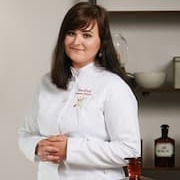 .
.
Ilona Krzak Master of Pharmacy
.
Hydrating treatments at the hairdresser's
.
Practically every hair salon has treatments on offer that can improve the appearance of hair. However, it is worth knowing that the effects of such treatments will not last. In the best case scenario, they will last for a few more washes.
The results will not last.
Once the hair structure is damaged, it cannot be restored - you have to wait until the hair grows backand. Still, there are times when you need a haircut now. And that's when it's worth a trip to the hairdresser. Look for restorative treatments on offer and ask the salon specialist which one will give the best result for your hair type and the degree of dryness and possible damage.
The most popular treatments to improve hair hydration include:
.
- .
- Hair Botox - has nothing to do with the Botox that is performed on the face. During this ritual, the hair scales are firstly parted, followed by highly nourishing blends containing, for example, hyaluronic acid and oils.
- Olaplex - a patented formula designed to penetrate deeply into the hair and fill in hair defects.
- Conditioning treatment - this tool resembles a straightener, but instead of heat it emits ultrasound and infrared. With its help, the hairdresser can introduce nourishing preparations deeper into the hair structure. .
- Hair sauna - is also a method of how to make the cosmetics used penetrate deep into the hair. The sauna emits heat, which causes the hair's cuticles to split open, resulting in the product applied to the hair being able to penetrate deeper.
- Hair sauna is also a method of making the cosmetics used penetrate deeper into the hair.
- The Joico Reconstructive Treatment - is a four-step treatment, carried out with the appropriate products. It includes cleansing, smoothing, reconstructing and moisturising the hair.
Supportive dietary supplements
.
Do you drink the right amount of water, try to eat healthily, keep humectants in mind in your hair care, and still feel it could be better? Try the right supplementation. Hydration and good condition of your hair will be taken care of by omega-3 acids and preparations with collagen and hyaluronic acid.
Natu Care Premium Collagen in mango-maracuja flavour has been further enriched with valuable vitamins A, C and E and hyaluronic acid:
.
Natu.Care Collagen Premium 5000 mg, mango & passion fruit

- Collagen content: 5000 mg marine collagen hydrolysate
- Additional active ingredients: vitamin C, low molecular weight hyaluronic acid (and L-theanine and coenzyme Q10 in cocoa flavoured collagen or vitamin A and vitamin E in mango–passion fruit flavoured collagen)
- Form: powder sachets
- Dose: 1 sachet per day
- Sufficient for: 30 days
Product description
Fish collagen from the Natu.Care brand in a dose of 5000 mg, based on certified ingredients of the best quality. Regular supplementation will positively influence the appearance of the skinóry, hairów and nails – they will be rebuilt and strengthened from the inside.
In addition to collagen, which is valuable for health and beauty, it also offers other active ingredients that help to maintain a youthful complexion, shiny hair and strong nails.
The formula contains a sufficient portion of the active ingredient to positively affect joints, the musculoskeletal system and immunity.
Natu.Care Premium Collagen is available in two flavours – Cacao Bloom and Rise&Shine. Both formulas are based on the following active ingredients: marine collagen hydrolysate, wild roseóbud extract and hyaluronic acid.
Additionally, Cacao Bloom contains natural L-theanine, coenzyme Q10 and defatted Dutch cacao. Rise&Shine instead contains vitamin E and vitamin A.
These are the best collagens in the world.
These best fish collagens on the market also rós taste – Cacao Bloom is a treat for chocolate lovers. Rise&Shine will appeal to those whoólike the refreshing taste of mangoófruit and passion fruit.
Pros and cons
Pros:
- Vitamin C supports the body's collagen production, enhancing its effectiveness.
- An effective dose of hyaluronic acid, which additionally supports skin hydration and joint health.
- Fish collagen absorbs 50% better. Additionally, the manufacturer specifies the fish species it is sourced from (Atlantic cod).
- The composition has been tested by the independent and accredited J.S. Hamilton laboratory.
- MSC (Marine Stewardship Council) quality certification, which confirms that the collagen source supports sustainable fishing practices.
Cons:
- None.
Additional information
Natu.Care's fish collagen receives praise for its delicious taste. You won't find the fishy aftertaste that often comes through in other collagens. Plus, you have two tasty flavors to choose from: cocoa and mango-passionfruit.
Active ingredients like coenzyme Q10, hyaluronic acid, and natural L-theanine provide anti-inflammatory and antioxidant benefits while slowing down aging processes.
User review
Super, after about 6 weeks of use, the skin on my face became noticeably firmer. Wonderful taste.
Ania ZalewskaNatu.Care customer
When choosing omega-3s, it is worth opting for those in triglyceride form, which assimilate most effectively. Also pay attention to whether the product has a TOTOX index - the lower, the better:
Product description
The dietary supplement contains omega-3ᵀᴳ, or omega-3 acids in the form of trójglyceridesów. Scientific studies suggest that this form of fatty acidsós up to 2 times better absorbed than the estersós present in many dietary supplements on the market. This means that you are assured of their effectiveness and of supplying yourself with valuable omega acids.
Fatty acids omega-3 are derived from wild anchovy oil. It is a rich source of healthy fats that are essential for the health of the cardiovascular, immune and nervous systems, as well as the proper function of vision, joints muscles.
Scientific research suggests that wild anchovies are a good source of healthy fats.
Scientific research also suggests that an adequate intake of omega-3 fatty acidsós protects against and supports the treatment of depression and anxiety disorders. In addition, omega-3s influence the hydration and appearance of the skinóry and support healthy sleep.
.
The formula contains a total of 750 mg of EPA+DHA acidsós, which is three times higher than the recommended minimum of 250 mg for the Polish population. Omega-3 TG Premium has studies indicating that its TOTOX is 9, which is a very good result.
Supplementation of omega-3 fatty acidsóis recommended for anyone who does not eat 1–2 portions (approximately 300 g) of oily fish per week. Children during growth, seniors, physically active people, vegans and vegetarians, as well as patients undergoing cardiovascular treatment and prevention of heart disease also have an increased need.
Pros and cons
The dietary supplement contains omega-3ᵀᴳ, or omega-3 acids in the form of trójglyceridesów. Scientific studies suggest that this form of fatty acidsós up to 2 times better absorbed than the estersós present in many dietary supplements on the market. This means that you are assured of their effectiveness and of supplying yourself with valuable omega acids.
Fatty acids omega-3 are derived from wild anchovy oil. It is a rich source of healthy fats that are essential for the health of the cardiovascular, immune and nervous systems, as well as the proper function of vision, joints muscles.
Scientific research suggests that wild anchovies are a good source of healthy fats.
Scientific research also suggests that an adequate intake of omega-3 fatty acidsós protects against and supports the treatment of depression and anxiety disorders. In addition, omega-3s influence the hydration and appearance of the skinóry and support healthy sleep.
.
The formula contains a total of 750 mg of EPA+DHA acidsós, which is three times higher than the recommended minimum of 250 mg for the Polish population. Omega-3 TG Premium has studies indicating that its TOTOX is 9, which is a very good result.
Supplementation of omega-3 fatty acidsóis recommended for anyone who does not eat 1–2 portions (approximately 300 g) of oily fish per week. Children during growth, seniors, physically active people, vegans and vegetarians, as well as patients undergoing cardiovascular treatment and prevention of heart disease also have an increased need.
Additional information
The dietary supplement contains omega-3ᵀᴳ, or omega-3 acids in the form of trójglyceridesów. Scientific studies suggest that this form of fatty acidsós up to 2 times better absorbed than the estersós present in many dietary supplements on the market. This means that you are assured of their effectiveness and of supplying yourself with valuable omega acids.
Fatty acids omega-3 are derived from wild anchovy oil. It is a rich source of healthy fats that are essential for the health of the cardiovascular, immune and nervous systems, as well as the proper function of vision, joints muscles.
Scientific research suggests that wild anchovies are a good source of healthy fats.
Scientific research also suggests that an adequate intake of omega-3 fatty acidsós protects against and supports the treatment of depression and anxiety disorders. In addition, omega-3s influence the hydration and appearance of the skinóry and support healthy sleep.
.
The formula contains a total of 750 mg of EPA+DHA acidsós, which is three times higher than the recommended minimum of 250 mg for the Polish population. Omega-3 TG Premium has studies indicating that its TOTOX is 9, which is a very good result.
Supplementation of omega-3 fatty acidsóis recommended for anyone who does not eat 1–2 portions (approximately 300 g) of oily fish per week. Children during growth, seniors, physically active people, vegans and vegetarians, as well as patients undergoing cardiovascular treatment and prevention of heart disease also have an increased need.
Expert opinion
The dietary supplement contains omega-3ᵀᴳ, or omega-3 acids in the form of trójglyceridesów. Scientific studies suggest that this form of fatty acidsós up to 2 times better absorbed than the estersós present in many dietary supplements on the market. This means that you are assured of their effectiveness and of supplying yourself with valuable omega acids.
Fatty acids omega-3 are derived from wild anchovy oil. It is a rich source of healthy fats that are essential for the health of the cardiovascular, immune and nervous systems, as well as the proper function of vision, joints muscles.
Scientific research suggests that wild anchovies are a good source of healthy fats.
Scientific research also suggests that an adequate intake of omega-3 fatty acidsós protects against and supports the treatment of depression and anxiety disorders. In addition, omega-3s influence the hydration and appearance of the skinóry and support healthy sleep.
.
The formula contains a total of 750 mg of EPA+DHA acidsós, which is three times higher than the recommended minimum of 250 mg for the Polish population. Omega-3 TG Premium has studies indicating that its TOTOX is 9, which is a very good result.
Supplementation of omega-3 fatty acidsóis recommended for anyone who does not eat 1–2 portions (approximately 300 g) of oily fish per week. Children during growth, seniors, physically active people, vegans and vegetarians, as well as patients undergoing cardiovascular treatment and prevention of heart disease also have an increased need.
Home remedies for dry hair
.
Hydrating ingredients for your hair can be found not only at the hairdresser's or in cosmetics from the shop shelves. You also have them in ... your kitchen. And practically for free.
Hydrating ingredients for your hair
Hydrating ingredients you can use to create a homemade hair mask:
- honey, .
- yolk, .
- avocado, .
- flaxseed, .
- banana, .
- coconut milk, .
- pumpkin (cooked and cooled), .
To create a homemade hair mask, all you need to do is choose two or three ingredients from this list and blitz thoroughly to a smooth paste. You can also enrich your composition with a protein ingredient, such as natural yoghurt, or emollients, such as the indispensable olive oil.
And if we are talking about a homemade hair mask, you can also use the following ingredients.
And while we're on the subject of that liquid gold, you can also try oiling your hair with it. Olive oil will smooth your strands and also give them essential moisture and other valuable nutrients.
And while we're at it, you can also try oiling your hair with it.
Egg yolk is a vitamin bomb for hair..
 .
.
Ilona Krzak Master of Pharmacy
.
Hydrating curly hair
.
Moisturising curly hair should focus primarily on not weighing it down too much, which can lead to straightening of the curl (worst). Holders of bouncy curls are particularly prone to dryness due to the specific structure of their hairand.
.
This is why it is a good idea to regularly use nourishing and moisturising masks and conditioners specifically designed for curly hair. These cosmetics are often labelled as compatible with the CG method, or Curly Girl Method.
.
This is a way of caring for curls that involves eliminating waxes and silicones and other substances sticky to the hair that can overload it. CG cosmetics are formulated to meet the needs of curly strands and are designed to accentuate their curl.
Urea will work well here to plump up the scalp and act as a promoter of active ingredient absorption.
 .
.
Ilona Krzak Master of Pharmacy
Don't forget your scalp
.A healthy and moisturised scalp is essential for the rapid growth of strong, shiny hair. So it's worth taking care of it too. But here's where you might run into a problem: Most conditioners and hair masks are not suitable for application to the scalp, as they can clog and irritate it.
To nourish the scalp, the scalp needs to be protected.
To nourish the scalp and prevent dryness, use gentle shampoos, cowashes or cleansing conditioners and lotions on a daily basis. Use stronger products once or twice a week, unless your trichologist advises you otherwise.
For the scalp to be properly moisturised, it's important to use the following products.
For proper moisturisation of the scalp, you can use hair rubs. Among hair-lovers they have become very popular in recent years, so you can find them in almost every drugstore (yes, in grocery too). If you care about their soothing and moisturising effects, choose those without ethyl alcohols and warming substances (e.g. pepper, capsaicin).
And if your scalp is itchy, flaky or develops any changes (e.g. small pimples), visit a trichologist before you start treatment with cosmetics, oils or homemade masks. The specialist will assess the condition of your scalp in an examination and recommend the appropriate treatment.
Summary
.- Hair that needs moisturising is dull and rough to the touch.
- Hair that needs moisturising is dull and rough to the touch.
- Hair that is often overdried promotes breakage and split ends.
- Hair that is overdried promotes breakage and split ends.
- Hair can be dried out by improper care and styling, as well as bleaching or perming treatments. Other factors include atmospheric conditions and lack of sufficient hydration. .
- To moisturise your hair, use cosmetics with humectants in their composition. .
- Choose nourishing and regenerating treatments at the hairdresser's. .
- Diet also has an impact on improving the condition of your hair, including drinking enough water daily. Dietary supplements such as collagen, hyaluronic acid or omega-3 fatty acids can also help.
- Hair health is also important.
- Hair oiling and homemade masks can be helpful in moisturising hair. .
- Handlers of curly hair, in their hair care routines, should pay attention to using light cosmetic formulas that will not weigh down the hair or spoil its curl.
- Healthy hair means a healthy scalp. Take care to moisturise and nourish your scalp too. .
FAQ
.How do I moisturise my hair after bleaching?
.To moisturise hair after the bleaching process, use an intensive conditioner or moisturising mask with a rich formula. This product should contain ingredients such as keratin, argan oil or shea butter to help strengthen and regenerate the hair.
Apply such a product regularly, at least once a week. Avoid excessive heat styling - the use of straighteners and curling irons, as this can further dry out the hair.
Attend to this product regularly, at least once a week.
How do I moisturise my hair extensions?
.To properly moisturise your hair extensions, you should regularly use conditioners and masks specifically designed for synthetic or natural hair. You can also spray your hair with a solution of water and a little argan or coconut oil to prevent dryness. Remember not to apply these products to the area where the strands are joined, as this can weaken the hold.
Do not overuse hot styling tools to style your hair extensions, as the heat can contribute to damage and dryness. Carefully comb hair with a wide-toothed comb to avoid tangling and breakage. Remember that caring for your hair extensions in the same way as you would for your natural hair can prolong the life of your hair and keep it looking healthy.
How to moisturise hair from the inside out
.To moisturise hair from the inside, it is important to ensure that the body is properly hydrated, as water deficiency can contribute to dry scalp and hair. Diet rich in healthy fats, such as fish oils, avocados, nuts and seeds, can also help hydrate hair from within.
Additional supplementation with omega-3 acids and vitamins A, E, C and biotin can support healthy hair growth and condition. Regular use of moisturising masks and hair conditioners also increases hydration levels from the outside in. It's worth avoiding excessive use of heat styling appliances, which can lead to dry hair.
How to moisturise your hair naturally
.There are several ways to moisturise your hair naturally:
.- Oiling: Regularly oiling your hair with natural oils, such as coconut oil, argan oil or jojoba oil, helps moisturise dry ends and prevent hair breakage.
- Homemade conditioners: Use natural ingredients such as honey, yoghurt or eggs to create homemade masks that will nourish and moisturise your hair.
- Avoid aggressive treatments: limit the use of straighteners, curling irons and other styling tools on your hair to avoid dryness. .
- Adequate dietary water: Drink enough water to keep both the scalp and hair hydrated. .
Remember to follow these methods regularly to keep your hair healthy and hydrated.
How to moisturise your hair at night?
.In order for your hair to benefit from an extra dose of moisture and nutrients throughout the night, in the evening you can apply an oil of your choice (such as coconut oil) to the length of your hair. Remember to apply a small amount of product so that it doesn't run off your strands.
.You can also choose from special masks and conditioners for overnight application. You can find these in many drugstores. Some of the most popular have the Anwen brand in their range. You can also purchase a special turban for your nightly hair care routine to prevent pillow dirt.
What does dry hair lack?
.Dry hair often lacks lipids in addition to water. To improve the condition of dry hair, it is essential to moisturise and nourish it regularly. Use moisturising conditioners and masks rich in humectants and emollients such as oils (e.g. coconut oil, argan oil), vegetable butters (e.g. shea butter), panthenol, glycerine.
.These ingredients will penetrate deep into the hair, moisturise and rebuild it. Also avoid frequent use of hot styling equipment, as high temperatures dry out the hair. Remember to trim your ends regularly to prevent splitting and moisture loss.
What to do when your hair feels like hay?
.Start by assessing your daily hair care routine. Use conditioners and shampoos designed for dry and damaged hair to help moisturise and strengthen it. Use mild shampoos to wash your head.
Invest in nourishing hair masks to restore shine and elasticity. Avoid hot drying your hair and use heat protection before using a straightener or hairdryer. Quick results will also come from oiling your hair wet treatment. It will soften and smooth the strands and add shine.
Regular trimming of the ends will help get rid of split hairs and improve the overall appearance of your hairstyle. Remember to provide your hair with the right dose vitamins and minerals through a balanced diet to aid in its regeneration.
Resources
.See all
.Dry hair Information | Mount Sinai-New York. (n.d.). Mount Sinai Health System. Retrieved March 5, 2024, from https://www.mountsinai.org/health-library/symptoms/dry-hair
How to stop damaging your hair. (n.d.). Retrieved March 5, 2024, from https://www.aad.org/public/diseases/hair-loss/insider/stop-damage
Humectant-An overview | ScienceDirect Topics. (n.d.). Retrieved March 5, 2024, from https://www.sciencedirect.com/topics/chemistry/humectant
Lee, Y., Kim, Y.-D., Hyun, H.-J., Pi, L., Jin, X., & Lee, W.-S. (2011). Hair Shaft Damage from Heat and Drying Time of Hair Dryer. Annals of Dermatology, 23(4), 455-462. https://doi.org/10.5021/ad.2011.23.4.455
Nayak, B. S., Ann, C. Y., Azhar, A. B., Ling, E. C. S., Yen, W. H., & Aithal, P. A. (2017). A Study on Scalp Hair Health and Hair Care Practices among Malaysian Medical Students. International Journal of Trichology, 9(2), 58-62. https://doi.org/10.4103/ijt.ijt_76_16
Qu, W., Guo, X., Xu, G., Zou, S., Wu, Y., Hu, C., Chang, K., & Wang, J. (2022). Improving the Mechanical Properties of Damaged Hair Using Low-Molecular Weight Hyaluronate. Molecules, 27(22), Article 22. https://doi.org/10.3390/molecules27227701
.Restoring dry, damaged hair with a novel natural wheat protein and wheat germ oil- containing shampoo and conditioner line. (2010). Journal of the American Academy of Dermatology, 62(3), AB77. https://doi.org/10.1016/j.jaad.2009.11.320
Robinson, V. (1976). A study of damaged hair. J Soc Cosmet Chem, 27.
Sinclair, R. D. (2007). Healthy Hair: What Is it? Journal of Investigative Dermatology Symposium Proceedings, 12(2), 2-5. https://doi.org/10.1038/sj.jidsymp.5650046
Editorials
Meet the team


Find out what to do when hair starts to fall out by the handful.
![Hair oiling: overnight, wet, dry [home remedies].](https://cdn-resources.natu.care/uploads/1/side_view_man_hair_slugging_night_routine_1_95e3d6a24c.jpg)
Everything you need to know to do hair oiling at home.
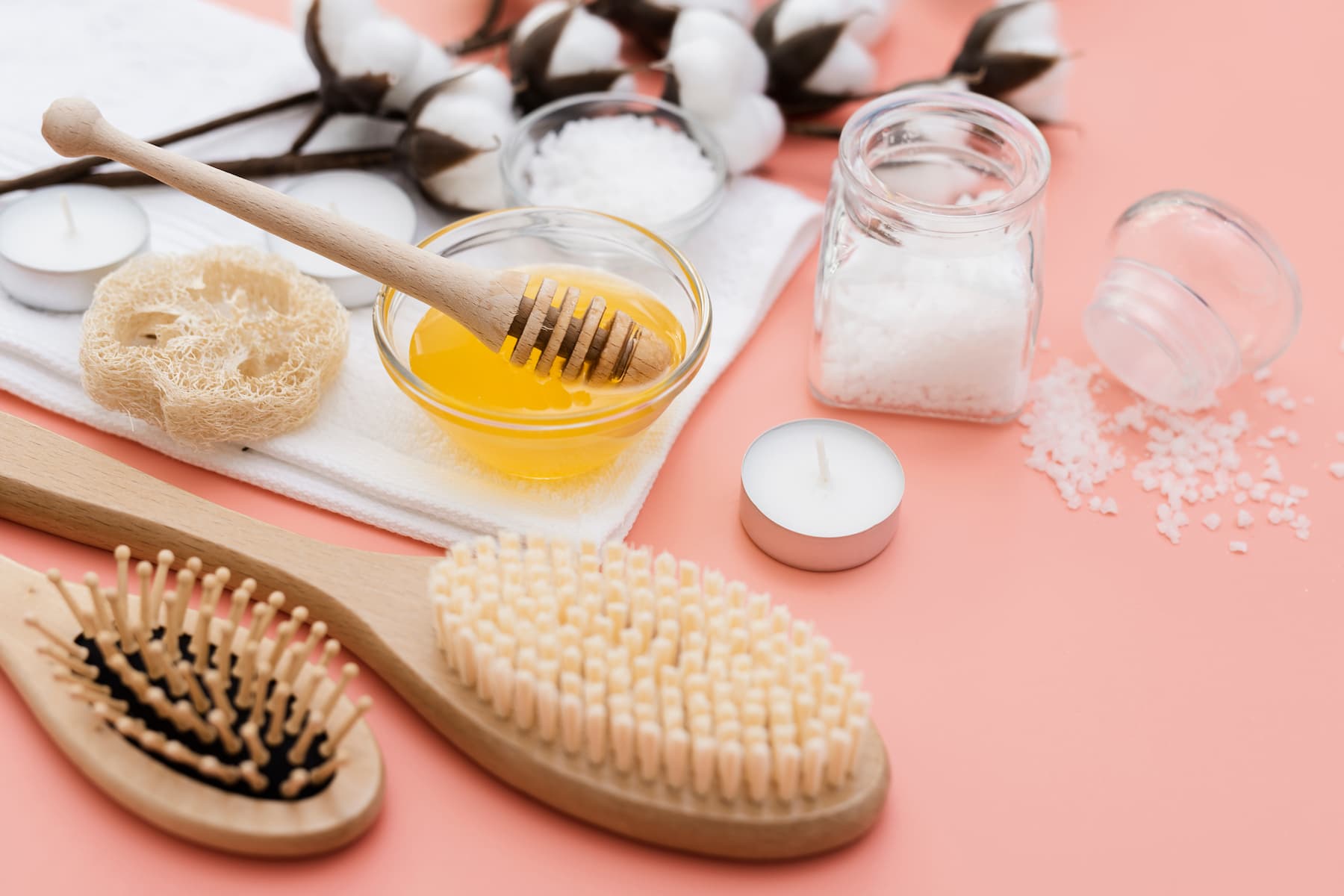
Before you click Buy Now at the online drugstore, check what hair 'cosmetics' you can find in your kitchen.
